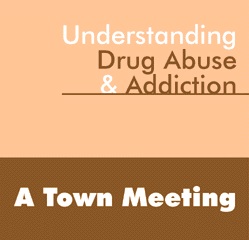
| May 6, 1999
Dear Colleague:
Welcome to Understanding Drug Abuse & Addiction: Myths vs. Reality. We are proud to co-sponsor this important event.
During the course of this day, we will learn about the latest advances and scientific findings in the field of substance abuse. The knowledge gained here will enhance the good work already being performed in the areas of substance abuse prevention, treatment, and enforcement in Georgia communities.
Today's town meeting offers a unique opportunity to improve our understanding of substance abuse and addiction. It offers the community new insights and approaches. The damage inflicted by the latest wave of addiction, the crack cocaine epidemic, has inspired this coming together of prevention and treatment providers, doctors, medical researchers, mental health professionals, public health officials, and community programs. We unite in a joint effort to reverse the effects of addiction on our cities, our towns, our neighborhoods, and our families.
We are grateful to the National Institute on Drug Abuse and its Director, Dr. Alan Leshner, for making this town meeting possible. We are also appreciative of the many substance abuse professionals who are working to improve Georgians' understanding of the myths and realities of drug abuse and addiction.
Your participation is a sign of your commitment to create better programs, craft stronger policy, and address the root problems of addiction.
Yours truly,
Emory University
Morehouse School of Medicine
National Families in Action
PRIDE
Georgia Association for the Prevention and Treatment of Substance Abuse |
|


Understanding Drug Abuse and Addiction: Myths vs. Reality
The Carter Center
One Copenhill
453 Freedom Parkway
Atlanta, Georgia
Thursday, May 6, 1999
Program Book
Planning Committee
National Institute on Drug Abuse
Timothy P. Condon, Ph.D.
Andrea Baruchin, Ph.D.
Beverly Wyckoff Jackson
Lucinda Miner, Ph.D.
Jack B. Stein, L.C.S.W.
Office of the Mayor, City of Atlanta Phil McDonald
Georgia Department of Human Resources Division of Mental Health, Mental Retardation, and Substance Abuse Elizabeth F. Howell, M.D.
Emory University
Michael J. Kuhar, Ph.D.
Morehouse School of Medicine
Charles Releford
National Families in Action
Sue Rusche
PRIDE, Inc.
J. Douglas Hall |
Georgia Association for the Prevention and Treatment of Substance Abuse
Becky Vaughn
Management Assistance Corporation
Glen Fischer
Traci Eng, M.S.W.
Donald Thompson
Tracy Mecanko
Char Glendening
Tanya Singer
Matt Mowzcko
Special Thanks To:
Mary Larson, Community Anti-Drug Coalitions of America
Kendra Warhurst, Multi-Jurisdictional Counter Drug Task Force Training Program
Georgia Addiction Counselors Association
National Association of Social Workers
The Staff at The Carter Center
LaSandra Milner
Lisa Wiley
Bruce Harlan, Lighting and Production Equipment, Inc.
Proof of the Pudding
Marie Sutton |
ACCME Accreditation Statement for Joint Sponsored Activities
This activity has been planned and implemented in accordance with the Essentials and Standards of the Accreditation Council for Continuing Medical Education (ACCME) through the joint sponsorship of Morehouse School of Medicine and the National Institute on Drug Abuse, National Institutes of Health.
The Morehouse School of Medicine is accredited by the ACCME to provide continuing medical education for physicians.
The Morehouse School of Medicine designates this continuing medical education activity for up to six credit hours in Category 1 of the Physician's Recognition Award of the American Medical Association. |
|